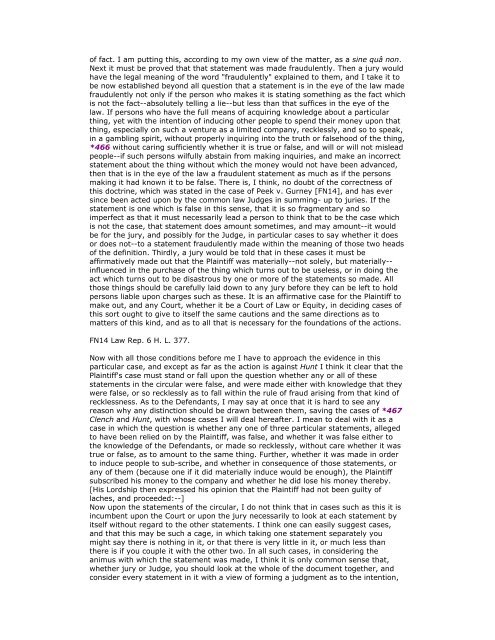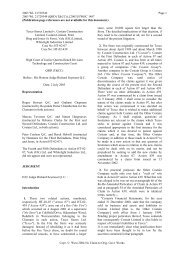Edington v Fitzmaurice - Thomson Reuters
Edington v Fitzmaurice - Thomson Reuters
Edington v Fitzmaurice - Thomson Reuters
Create successful ePaper yourself
Turn your PDF publications into a flip-book with our unique Google optimized e-Paper software.
of fact. I am putting this, according to my own view of the matter, as a sine quâ non.Next it must be proved that that statement was made fraudulently. Then a jury wouldhave the legal meaning of the word "fraudulently" explained to them, and I take it tobe now established beyond all question that a statement is in the eye of the law madefraudulently not only if the person who makes it is stating something as the fact whichis not the fact--absolutely telling a lie--but less than that suffices in the eye of thelaw. If persons who have the full means of acquiring knowledge about a particularthing, yet with the intention of inducing other people to spend their money upon thatthing, especially on such a venture as a limited company, recklessly, and so to speak,in a gambling spirit, without properly inquiring into the truth or falsehood of the thing,*466 without caring sufficiently whether it is true or false, and will or will not misleadpeople--if such persons wilfully abstain from making inquiries, and make an incorrectstatement about the thing without which the money would not have been advanced,then that is in the eye of the law a fraudulent statement as much as if the personsmaking it had known it to be false. There is, I think, no doubt of the correctness ofthis doctrine, which was stated in the case of Peek v. Gurney [FN14], and has eversince been acted upon by the common law Judges in summing- up to juries. If thestatement is one which is false in this sense, that it is so fragmentary and soimperfect as that it must necessarily lead a person to think that to be the case whichis not the case, that statement does amount sometimes, and may amount--it wouldbe for the jury, and possibly for the Judge, in particular cases to say whether it doesor does not--to a statement fraudulently made within the meaning of those two headsof the definition. Thirdly, a jury would be told that in these cases it must beaffirmatively made out that the Plaintiff was materially--not solely, but materially--influenced in the purchase of the thing which turns out to be useless, or in doing theact which turns out to be disastrous by one or more of the statements so made. Allthose things should be carefully laid down to any jury before they can be left to holdpersons liable upon charges such as these. It is an affirmative case for the Plaintiff tomake out, and any Court, whether it be a Court of Law or Equity, in deciding cases ofthis sort ought to give to itself the same cautions and the same directions as tomatters of this kind, and as to all that is necessary for the foundations of the actions.FN14 Law Rep. 6 H. L. 377.Now with all those conditions before me I have to approach the evidence in thisparticular case, and except as far as the action is against Hunt I think it clear that thePlaintiff's case must stand or fall upon the question whether any or all of thesestatements in the circular were false, and were made either with knowledge that theywere false, or so recklessly as to fall within the rule of fraud arising from that kind ofrecklessness. As to the Defendants, I may say at once that it is hard to see anyreason why any distinction should be drawn between them, saving the cases of *467Clench and Hunt, with whose cases I will deal hereafter. I mean to deal with it as acase in which the question is whether any one of three particular statements, allegedto have been relied on by the Plaintiff, was false, and whether it was false either tothe knowledge of the Defendants, or made so recklessly, without care whether it wastrue or false, as to amount to the same thing. Further, whether it was made in orderto induce people to sub-scribe, and whether in consequence of those statements, orany of them (because one if it did materially induce would be enough), the Plaintiffsubscribed his money to the company and whether he did lose his money thereby.[His Lordship then expressed his opinion that the Plaintiff had not been guilty oflaches, and proceeded:--]Now upon the statements of the circular, I do not think that in cases such as this it isincumbent upon the Court or upon the jury necessarily to look at each statement byitself without regard to the other statements. I think one can easily suggest cases,and that this may be such a cage, in which taking one statement separately youmight say there is nothing in it, or that there is very little in it, or much less thanthere is if you couple it with the other two. In all such cases, in considering theanimus with which the statement was made, I think it is only common sense that,whether jury or Judge, you should look at the whole of the document together, andconsider every statement in it with a view of forming a judgment as to the intention,
















